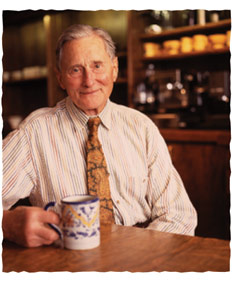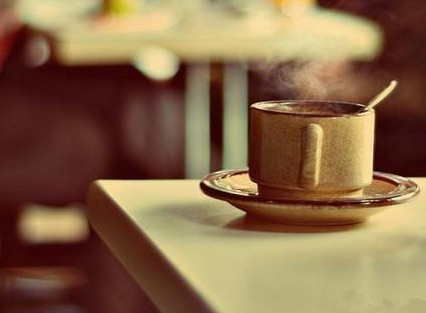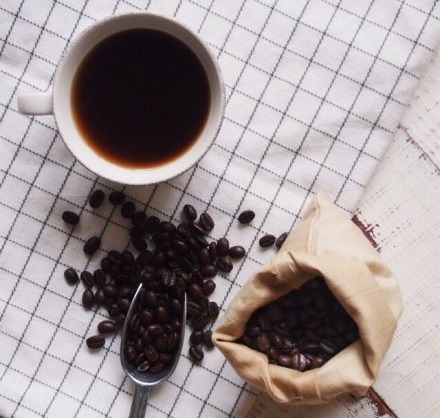Alfred Peet, the godfather of the modern boutique coffee movement

Coffee Master Alfred Pitt (Alfred Peet, 1920-2007)
In the field of boutique coffee, everyone knows that he led the United States to get rid of the stigma of "cowboy coffee" (or dishwashing water coffee) and became the first person in a large country of boutique coffee. He died on August 29th, 2007. when he died, major media in the United States, such as the New York Times and the Washington Post, all reported the outstanding contributions of a generation of gurus to the improvement of the coffee industry in the United States. We can see its influence in the coffee industry in the United States.
It is said that in the 1950s and 1960s, although the United States was the largest consumer of coffee, it imported the so-called "unified goods" of secondary bean inferior products (such as Brazil's No.5, 6 grade), which could not enter the hall of coffee taste evaluation at all. The United States used to have nothing to do with fine coffee. From the "cowboy coffee" in the 19th century to the "dishwashing water coffee" after the end of World War II, Europeans ridiculed that the United States did not understand coffee and had no coffee culture.

However, after 1966, the United States quietly launched a decades-long fine coffee revolution, which has not stopped until now. Dutch-born roaster Alfred Peet is the leader, and his Peet's Coffee, Tea, and Spices is hailed as the birthplace of American re-baked fashion and espresso. Three Starbucks founders Jerry Baldwin (Jerry Baldwin), Gordon Pork (Gordon Bowker) and Zev Siegl were enlightened in "Biz Coffee". The three men also learned to roast under Pitt's own training. In 1971, they went to Seattle to open Starbucks Coffee. The beans in the first year of the store were still manufactured by Bizi Coffee, and the next year they set up Starbucks' own roaster. Baldwin took over the roasting task. As for the well-known current Starbucks helmsman Howard Schultz (Howard Schultz), he had no idea what coffee was at the time and was not hired as Starbucks' marketing director until 1982. So master Alfred Pitt can be said to be the ancestor of Starbucks in the United States!
In 1987, Howard Schultz successfully introduced external funds to buy Starbucks, inherited the legacy of Starbucks over the past decade, and transformed Starbucks into a chain of coffee shops selling beverages, leaping into an international brand. Starbucks, led by Howard Schultz, still regards Bitt as its spiritual leader. Even George George Howell, a master of shallow roasting on the east coast of the United States and one of the founders of the "extraordinary Cup" international boutique bean auction, was an early believer in Bitz's re-roasted coffee, but later betrayed Pitt's re-roasting style to embrace shallow roasting and attacked the violence of re-roasting, igniting a debate between deep-roasting and shallow roasting and sparking a bear spark in boutique coffee.
So Alfred Pitt can be said to be the godfather of fine coffee in the United States. without the "Bitz Coffee" he founded, there would be no Starbucks today, let alone George Hall's own shallow roasting argument. there is also no "extraordinary cup" international auction for boutique coffee. The founder of Bitz Coffee in Berkeley, California, can be called the most legendary grandparent cafe in the United States, and is still a pilgrimage place for coffee players around the world.

Born in the Netherlands, his father was in the coffee and tea business. He immigrated to the United States in 1955 and opened his first coffee shop ten years later, namely Peet's Coffee& Tea Coffee and Tea in Berkeley on the west coast of the United States in 1966. At that time, all the coffee on the market in the United States was mass-produced in factories, and it took too long from production to distribution. By the time consumers reached their hands, the coffee beans had passed their shelf life and lost most of their flavor. Mr. Pitt began selling small and freshly roasted coffee beans, which were popular with consumers. Mr. Pitt insisted on using 100% Arabica beans and never sold coffee beans before the second explosion. If the deep-baked beans are roasted and brewed in the right way, you can get a very sweet, rich and thick coffee, which is completely different from the bitter and astringent coffee in general impression.

Before Mr. Pitt set foot in the United States, he was just a bad boy who played coffee and gave up his studies. In 1922, ○, he was born in the Netherlands. His father was a coffee baker in the Dutch town of Alkmaar, but he thought it was too hard to bake beans and didn't want his son Pitt to take over. He asked him to study more and become a clerk in the future. But Pitt didn't like to go to school since he was a child, and he always liked to linger in his father's bakery to smell incense and play with coffee. At the age of 18, he learned European re-baking techniques and bean matching tips, and during World War II, he was caught by Germany in a labor camp to make coffee for the Germans. He returned home after the war in 1948, but he didn't get along with his father and ran away from home angrily. He went to Indonesia to join coffee and tea farmers to realize his dream of coffee, so he knew a lot about Java, Sumatra, New Guinea and other Asian beans. Warm up for the famous mixed coffee "Major DiCarson mixed Coffee" (Major Dickason's Blend), "Garuda Blend" and "Pacific Blend" in the future. In 1955, Mr. Pitt emigrated to San Francisco alone at the age of 35 and worked for a coffee importer. He couldn't bear to see the boss add a lot of thick beans to the formula beans and sell half-baked coffee. In 1965, he contradicted the boss and was fired. Next year, Mr. Pitt decided to open an European-style cafe that specializes in re-baked beans and espresso (including light roasted and thick beans as a refusal) to show Americans what a good coffee is, which is strong but not bitter, mellow and moisturizing.

Mr. Pitt claims to be a glutton for coffee, which is particularly unusual in the age of light coffee. "many people think that I love espresso and I am a hopeless coffee drinker, but it is not," he said. I am a stubborn coffee connoisseur, I like small and strong, high quality and fine coffee. I hate tasteless bad coffee. There are often people who pretend to understand and say that they need to drink more than six cups a day to be called coffee experts. I want to ask them whether they are drinking tea or coffee. Drinking two cups of fragrant coffee a day is better than ten cups of light coffee as thin as water. "in the 1960s, light coffee was dominant, and Mr. Pitt's European-style re-baked coffee was particularly out of place and difficult to find a market. However, the postwar baby boom in the United States has given birth to a group of hedonistic young people who have not been baptized by the war, are sensitive to taste buds and are picky about eating and drinking, and these people naturally become iron guards or loyal followers of "Bizi Coffee." "Biz Coffee" emphasizes selling only freshly baked beans, so it stands out. Dark and fragrant re-roasted coffee has spread across the United States like a prairie fire, becoming a new coffee fashion that competes to imitate.

Instead of resorting to media advertising, Mr. Pitt sat in the store himself, using ── to explain the similarities and differences of coffee from different places to customers while baking beans and teaching them the correct brewing method. At that time, most of the people who bought coffee beans were women, and they were deeply moved by Mr. Pitt's enthusiasm for explaining coffee in person. When they came to the door, they would bring their husbands or friends to accompany them to feel Mr. Pitt's unique enthusiasm. There are more and more people, and there are long queues as soon as the shop opens in the morning, which also drives the business of nearby shops. Mr. Pitt was so busy that he hired two young women at first. He teaches new employees how to evaluate coffee with their nose, eyes and mouth. The most common saying is: "Coffee beans can talk." To understand their language, it takes a long time to learn, and it takes at least a year to understand the esoteric language. "under his training, the staff who got a glimpse of the coffee hall excitedly passed on the experience to the guests, so this enthusiasm also spread to the consumers, and their fame spread like wildfire.
Mr. Pitt has an excellent way of selling coffee beans. He never advertises and is still full of people. He often said, "products are marketed for me, beans speak for me." When you drink to a sweet place, the guests will come! "he disdains to boast in front of the guests that Bizi's re-baked beans are different, and firmly believes that everything depends on quality. Before selling beans, he would personally soak a pot for guests to drink and let them taste the coffee they wanted to buy, whether it was full-bodied, sweet and fresh. Almost no one resisted Mr. Pitt's current offensive and took out his pockets to buy not only fresh beans but also Mr. Pitt's enthusiasm. Mr. Pitt's business style was unusual in an era when he only sold stale canned coffee; he sold ingredients such as cooked beans, tea and spices, not cups of coffee drinks, but was willing to invite door-to-door guests to try coffee for free. By the way, listen to his re-roasted coffee scriptures and the importance of fresh baking and fresh brewing. This is contrary to the fact that the current cafes mainly sell drinks and supplemented by selling cooked beans.

Some people describe Mr. Pitt as full of the charming charm of coffee, stubbornly choosing the good with his own strength, not seeking self-interest against the overall situation, breaking the long-standing monopoly of the American baking industry to make huge profits, and not hiding private music to share with others. Teaching Americans how to taste the mellow aroma of coffee has a significant and far-reaching impact on American character and cuisine! The philosopher is dead. If you want to describe Mr. Pitt's coffee life, use the master's own words to answer, "Let the coffee fragrance explain it to me!"
Important Notice :
前街咖啡 FrontStreet Coffee has moved to new addredd:
FrontStreet Coffee Address: 315,Donghua East Road,GuangZhou
Tel:020 38364473
- Prev

The best time to drink coffee is 9 / 30 / 11 / 30 / 30.
American scientists have calculated the best time to drink coffee every day, at 9: 30 in the morning. This is because caffeine interacts with an important hormone in the body (cortisol, also known as hydrocortisone), reaching its optimal state during this period. Cortisol helps the body adjust its biological clock and improve alertness. Cortisol levels, when people wake up,
- Next

Hidenori Izaki barista champion visit
Name: Hidenori Izaki title: 2014 World barista Competition WBC Champion occupation: Maruyama Cafe Chief barista official website: www.maruyamacoffee.com every year, thousands of baristas from all over the world gather together to compete for the highest honor in the world barista contest WBC crown
Related
- What is the difference between Indonesian Sumatra Mantinin coffee and gold Mantinin? How to distinguish between real and fake golden Mantelin coffee?
- What does bypass mean in coffee? Why can hand-brewed coffee and water make it better?
- Unexpected! Ruixing Telunsu lattes use a smoothie machine to foam milk?!
- % Arabia's first store in Henan opens into the village?! Netizen: Thought it was P's
- Does an authentic standard mocha coffee recipe use chocolate sauce or powder? Mocha Latte/Dirty Coffee/Salty Mocha Coffee Recipe Share!
- What is the difference between Vietnam egg coffee and Norway egg coffee? Hand-brewed single product coffee filter paper filter cloth filter flat solution!
- What is the difference between sun-cured and honey-treated coffee? What are the differences in the flavor characteristics of sun-honey coffee?
- How to make Italian latte! How much milk does a standard latte use/what should the ratio of coffee to milk be?
- How to make butter American/butter latte/butter Dirty coffee? Is hand-brewed coffee good with butter?
- Is Dirty the cold version of Australian White? What is the difference between dirty coffee/decent coffee and Australian white espresso?

